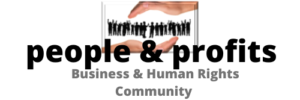News
Breaking silos:
UN South Asia Forum 2021 Tackles Workers’ Rights, SDGs, And Vaccination
(part 2 of a series)
Voltaire Veneracion
30 March 2021

Level up from BHR awareness-raising to activism!
Livio Sarandrea highlighted this common call from many of the Forum sessions on 19 March 2021’s Closing Plenary: A Roadmap for South Asia.
A human rights lawyer, Sarandrea is chief adviser and manager of UNDP’s project “Business and Human Rights in Asia promoting Responsible Business practices through regional partnerships (B+HR Asia).”
SDGs and due diligence
Sarandrea was moderator of the 17 March 2021’s session on BHR and the Sustainable Development Goals (SDGs) organised by UNDP, The Next Decade of Action: Connecting Sustainable Development and Business and Human Rights.
The program describes the latter session as follows:
If one looks at the entire spectrum of sustainable development goals, one can observe that businesses can have both positive and negative impacts on everything ranging from climate change, biodiversity, sustainable production and consumption, the rule of law, and so on. Indeed, all of these sustainable development issues have human rights implications, and they can also be addressed (at least partially) by applying the UNGPs. For example, States should realize that development cannot be unrestrained and must uphold their existing human rights obligations (i.e. respect, protect and fulfil human rights) to ensure sustainable development. Moreover, businesses should respect human rights. While ‘doing no harm’ to human rights is the absolute minimum responsibility of companies under the UNGPs, businesses can of course make huge positive contributions to sustainable development if they choose to do so. It is against this background that the session will focus on how to integrate sustainable development and business and human rights.
Session speaker Priyanga Hettiarachi is Westminster Foundation for Democracy’s country representative of Sri Lanka and Maldives.
Hettiarachi said he sees Human Rights Due Diligence (HRDD) as a practical tool from the UN Guiding Principles on BHR that may be used to assess contributions to SDGs, as well.
BHR, SDGs in Myanmar
Hettiarachi’s fellow session speaker Elin Wrzoncki is head of the BHR department at the Danish Institute for Human Rights, Denmark’s National Human Rights institution (NHRI).
For her part, Wrzoncki shared as an example of business action that conforms both to BHR and SDG’s Principle 16 (Peace, Justice and Strong Institutions) the joint statement by companies in Myanmar calling on its junta to preserve shared civic space and rule of law.
The above statement published online by Myanmar Centre for Responsible Business last 19 February 2021 reads:
Our companies, as investors in Myanmar, have watched with growing and deep concern the developments in Myanmar since the declaration of a state of emergency on 1st February.
Through our investments, operations, local partnerships and products, we support over a hundred thousand local jobs. The safety, security and wellbeing of our employees and those employed by our suppliers remains our primary concern. In recent days, we have sought to adapt our operations to ensure the safety of our employees and the provision of essential services to the Myanmar people – whether food and drink, electricity, telecommunications, financial services, logistics, healthcare or manufacturing – while respecting the individual rights to freedom of expression of our employees and the people of Myanmar.
As investors, we inhabit a ‘shared space’ with the people of Myanmar, including civil society organisations, in which we all benefit from respect for human rights, democracy and fundamental freedoms – including freedom of expression and association – and the rule of law. The rule of law, respect for human rights, and the unrestricted flow of information all contribute to a stable business environment.
We have always sought to operate in Myanmar transparently, and in line with core ILO Conventions and the UN Guiding Principles on Business and Human Rights. This includes undertaking ongoing human rights and wider business integrity due diligence, and complying with applicable sanctions, as well as the US Foreign Corrupt Practices Act (FCPA), the UK Anti-Bribery Act and Myanmar anti-bribery laws.
We will also continue to work hand in hand with local business partners which share the same approach. We believe our business presence, practices, and advocacy for a level playing field for all businesses, and our commitment to international human rights standards contribute in a significant way to the journey of openness and democracy in Myanmar.
We remain committed to our employees and to the people of Myanmar. We hope to see a swift resolution of the current situation based on dialogue and reconciliation in accordance with the will and interests of the people of Myanmar.
The statement, signed by Adidas, Coca-Cola, Facebook, Nestlé, Unilever, and other multinational companies, was supported by Myanmar companies (also listed on MCRB’s statement page) and endorsed by European Chamber of Commerce (EuroCham) in Myanmar.
Learn More
The program describes the background of the session on BHR and SDGs:
The United Nations 2030 Agenda for Sustainable Development and its accompanying Sustainable Development Goals (SDGs) outline 17 broad goals to ensure that development is socially and environmentally sustainable. Human rights are essential to achieving the SDGs. A development path in which human rights are not respected and protected cannot be sustainable. This is why the United Nations 2030 Agenda for Sustainable Development underlines that the aim of the SDGs is to “realize the human rights of all”. The United Nations Guiding Principles on Business and Human Rights (UNGPs) represent the global authoritative standard for what companies need to do to address human rights abuses connected to their business. Considering the linkages between sustainable development and human rights, as well as the significant power held by modern-day corporations, the UNGPs have a tremendous potential to drive positive change for the poorest and most marginalised people in our societies – those that risk being left behind, especially now amidst the socio-economic crisis caused by the ongoing COVID-19 pandemic.
Find out more about the links between BHR and the SDGs on DIHR’s site: biz.sdg.humanrights.dk
